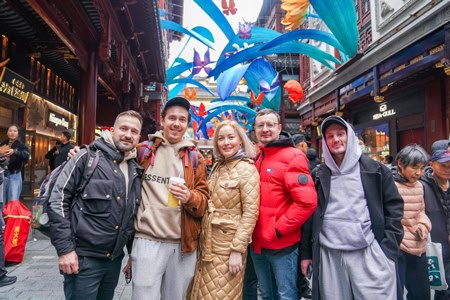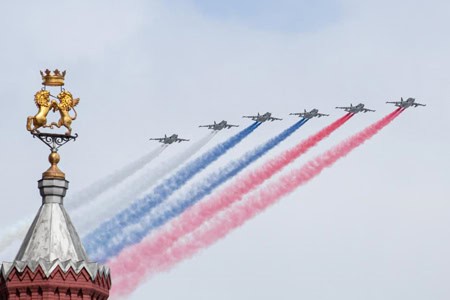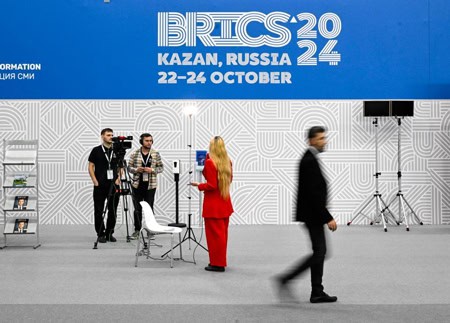At the invitation of Russian President Vladimir Putin, Chinese President Xi Jinping will pay a state visit to Russia from Wednesday to Saturday and attend the 80th anniversary of the victory in the Soviet Great Patriotic War in Moscow.
More than 80 years ago, the peoples of China, the Soviet Union and other countries fought side by side and secured victory in the World Anti-Fascist War, opening a new chapter in human history.
As the world undergoes accelerated changes not seen in a century, the international community is calling for greater global efforts to address common challenges and build a community with a shared future.
Xi Jinping's upcoming visit is expected to inject new impetus into the comprehensive strategic partnership between China and Russia for coordination in the new era. Moreover, it will show the determination of the two great countries to work with the rest of the world to safeguard the results of victory in World War II, promote international justice and maintain world peace and stability.
Long-lasting friendship
History and reality show that China and Russia are good neighbours who cannot move away from each other, and true friends who share joys and sorrows, support each other and achieve common development, Xi Jinping said during a telephone conversation with Putin in February.
The upcoming visit is Xi Jinping's 11th trip to Russia since becoming China's president. The two statesmen have met more than 40 times on different occasions over the years. Their close communication provides the strategic guidance under which China-Russia relations have matured into a resilient and stable partnership characterised by deepening political trust, closer strategic coordination and sustained practical cooperation.
In 2024, bilateral trade reached $244.8 billion, making China Russia's largest trading partner for 15 consecutive years. In December 2024, the China-Russia Eastern Route gas pipeline was fully completed. Cooperation in new sectors such as the digital economy, e-commerce, biomedicine, scientific and technological innovation, and green energy continues to expand.

The long-standing friendship between the two countries is increasingly popular between the two nations. An agreement on reciprocal visa-free travel for group tours has encouraged increased two-way travel. Hundreds of cultural events have been successively organized as part of the Sino-Russian Year of Culture.
Andrey Denisov, first vice chairman of the Foreign Affairs Committee of the Federation Council of Russia and former Russian ambassador to China, said that the strategic leadership of the two heads of state is a key factor to ensure the stable and long-term development of the China-Russia comprehensive strategic partnership for coordination in the new era.
The two leaders are expected to hold extensive and in-depth discussions on bilateral cooperation and multilateral issues, and the Russian side has high expectations, he added.
An indelible contribution
More than 80 years ago, China and Russia, as the main battlefields in Asia and Europe during World War II, made enormous sacrifices and unmistakable contributions to the final victory.
In a signed article published in the newspaper Rossiiskaya Gazeta ahead of his 2015 visit to Russia, Xi Jinping quoted Russian historian Vasily Klyuchevsky, who said: "If we lose memory of our past, our mind and soul will be lost in darkness," to express his remembrance of the history of the world anti-fascist war and his sincere expectation that the two nations will join hands to maintain world peace and stability.
The bitter lessons of World War II have taught humanity that the strong prey on the weak, the law of the jungle, warlike or hegemonic policies, the winner-take-all mentality and the zero-sum game do not bring coexistence, peace or development to humanity, Xi Jinping wrote in the article.

Bakir's leg, professor of political science at the American University in Cairo, said China and Russia, drawing lessons from history, have an important responsibility to safeguard international stability and cooperation amid today's complex global situation.
By studying, recovering and disseminating true history, people can better understand the Second World War and the post-war international order and thus resist attempts to distort historical facts, he added.
Andrej Fesjun, deputy director of the Institute of Asian and African Studies at Moscow State University, said that under the leadership of the two heads of state, China and Russia will continue to jointly promote a correct historical view of World War II and work together to maintain global strategic stability so as to make responsible contributions as major countries to the promotion of international justice.
Pioneers of progress
Eighty years ago, representatives of several countries, including China and the Soviet Union, met in San Francisco, United States, and signed the Charter of the United Nations, laying the foundation for the post-war international order.
The preamble of the Charter solemnly expresses the commitment "to practice tolerance and live together in peace as good neighbours and to join our forces to maintain international peace and security."
China and Russia have a natural responsibility to jointly steer and promote global governance in a direction that meets the expectations of the international community, and to participate in building a community with a shared future for humanity, Xi Jinping said when he met with Putin in March 2023. And it was during Xi Jinping's first visit to Russia in 2013 as Chinese president that he first introduced the vision of building a community with a shared future for humanity.
As permanent members of the UN Security Council and major countries of the world, China and Russia work closely together on the world stage. Beijing and Moscow firmly uphold the international system with the United Nations at its center, an international order underpinned by international law, and fundamental norms governing international relations based on the purposes and principles of the UN Charter. They also advocate genuine multilateralism.

The two countries are also working together on political solutions to international and regional hot topics. They have strengthened communication and coordination within multilateral mechanisms such as the United Nations, the Shanghai Cooperation Organisation (SCO), BRICS and the Group of 20, and are jointly committed to promoting a multipolar world and the democratisation of international relations.
Adhere Cavince, a Kenyan international relations expert, said China and Russia are working together through platforms such as the SCO and BRICS, which not only promotes a multipolar world but also strengthens the voice of the global South in global governance and a greater role in shaping the rules on major international issues.
Ilgar Velizade, President of the South Caucasus Political Science Club from Azerbaijan, said that the growing strength of multilateral cooperation mechanisms such as the SCO and BRICS is a powerful embodiment of the goals and principles of the UN Charter.
If countries engage in an active, constructive and sustainable dialogue focused on common interests, the world will be safer, the global economy more sustainable and the future of humanity more promising, he said.
thediplomaticsociety/gnews.cz



